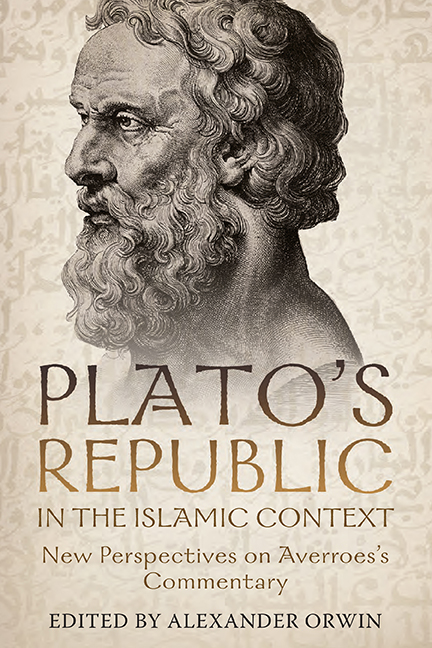Book contents
- Frontmatter
- Dedication
- Contents
- Introduction
- Part One Averroes and His Teachers
- Part Two Poetry, Philosophy, and Logic
- Part Three Law, Religion, and Philosophy
- Part Four Wisdom, Government, and the Character of the Political Community
- Part Five Averroes’s Reception in Europe
- Selected Bibliography
- Notes on the Contributors
- Index
7 - The Sharīʿa of the Republic: Islamic Law andPhilosophy in Averroes’s Commentary on Plato’s“Republic”
Published online by Cambridge University Press: 26 May 2022
- Frontmatter
- Dedication
- Contents
- Introduction
- Part One Averroes and His Teachers
- Part Two Poetry, Philosophy, and Logic
- Part Three Law, Religion, and Philosophy
- Part Four Wisdom, Government, and the Character of the Political Community
- Part Five Averroes’s Reception in Europe
- Selected Bibliography
- Notes on the Contributors
- Index
Summary
Averroes is one of the few Muslim philosophers whosework has had a considerable impact on Europeanthought; the phenomenon of Averroism has been a partof the common European intellectual heritage forseveral centuries. One of the most enduring andwidely held views, or rather myths, about Averroesfor centuries has been that he was a fierce enemy ofreligion. This view was partly rejected by ErnestRenan's classic nineteenth-century study, in whichhe critiqued what he called “lalegende d’Averroes.” Although a spiritedfollower of the Enlightenment's cult of science andbattle against superstition, and despite hisadmiration for Averroes as a figure who tried tokeep the spirit of reason alive during religiousages, Renan remained unconvinced by the chargesleveled against the Arab philosopher. He tried toshow how much this view of Averroes was aconstruction of the European mind in its own battlesover heterodoxy and free thought. Renan did not,however, settle for a narrative about theintellectual history of European Averroism, but wentbeyond this, depicting Averroes's rationalism andIslamic beliefs as two separate, independent spheresthat tend not to conflict with each other. That isto say, Averroes could have been a good Muslim aswell as a good philosopher. The historicistpresuppositions of Renan's thought,however—presuppositions according to which everysystem of thought is a product of its own time—madehis perspective on Averroes incoherent and open tofuture revisions. Leon Gauthier, although criticalof Renan, also tried to circumvent the question ofthe relationship between Islam and philosophy inAverroes's work. He did this by depicting Islam as areligion without substantial doctrinal content,thereby making possible its compatibility with Greekphilosophy. Gauthier therefore claimed thatAverroes's thought could be seen as “un rationalisme sans reserve [anunqualified rationalism]” withoutnecessarily rendering Averroes an unbeliever.Scholars like A. F. Mehren, Max Horten, and AsìnPalacio avoided such unsatisfactory solutions bywholeheartedly embracing the view that, in the end,Islamic philosophy is more Islamic than philosophic.They argued that the Islamic philosophy of thefalāsifa is anoutgrowth of Islamic beliefs expressed in thelanguage of Greek philosophy, and fully in theservice of Muslim revelation; therefore, accordingto these scholars, there is no real conflict betweenAverroes's philosophy and the tenets of Islam.
- Type
- Chapter
- Information
- Plato's Republic in the Islamic ContextNew Perspectives on Averroes's <i>Commentary</i>, pp. 160 - 181Publisher: Boydell & BrewerPrint publication year: 2022

